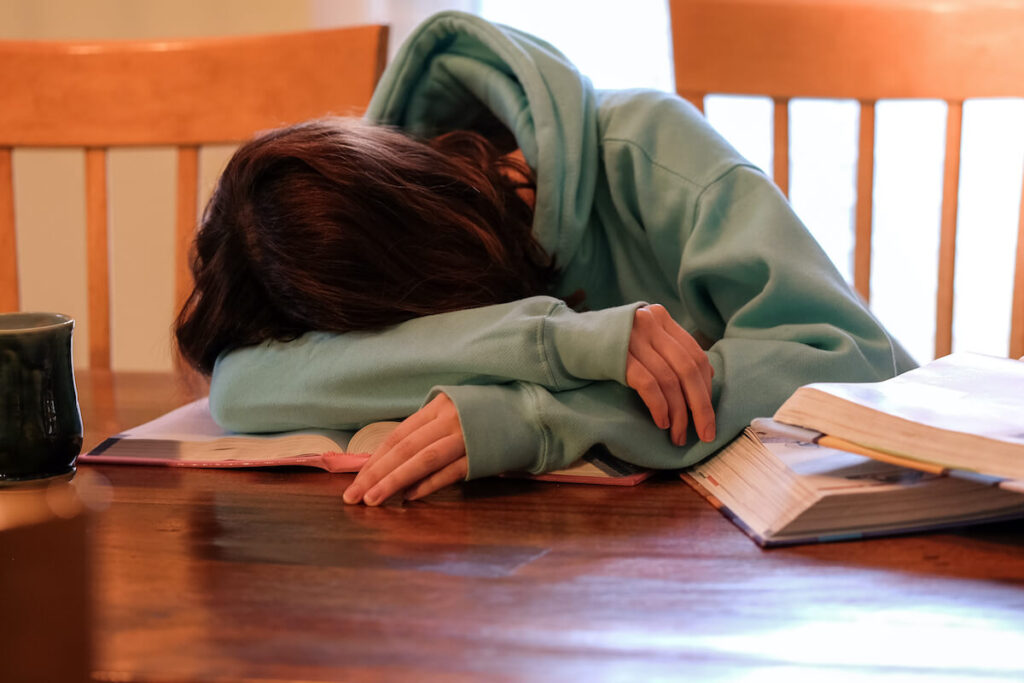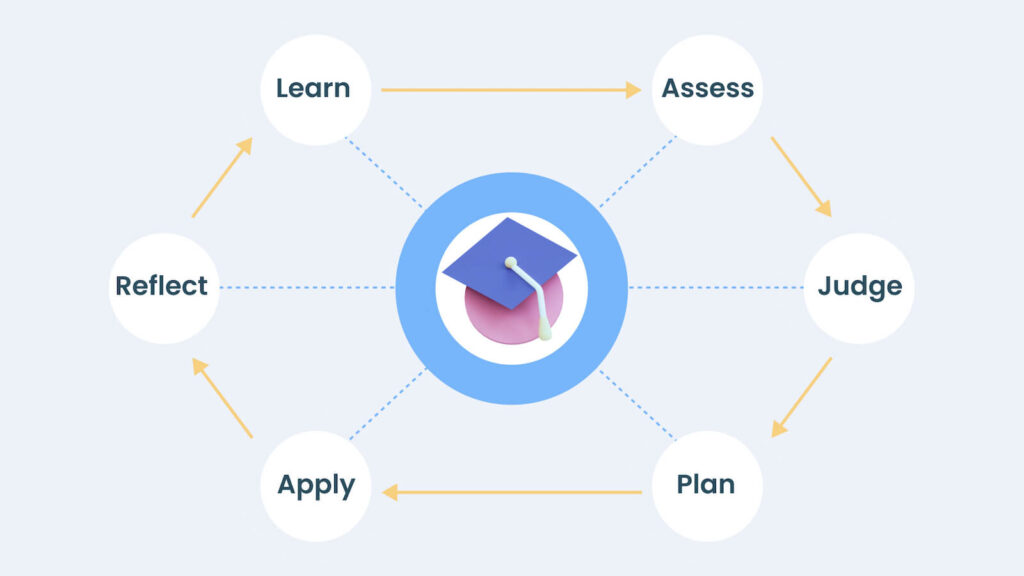Students of all ages know what it’s like to feel stressed before an upcoming exam, and most know that they need to study to achieve a high grade. Instead of cramming or overstudying, we can help students learn to use their time efficiently and implement effective study strategies for review, recall, and time management.
However, many students struggle to develop healthy study habits and know how much studying is too much. Study strategies will vary based on the class, student abilities and preferences, plus many other factors. There is no set number of hours or time frame that a student should study for the best outcome.
Many students default to overstudying when they are unsure of how much or when to study for the best results. Contemporary society and hustle culture stress hard work above most else, and this ethos has imbued academic life just as much as professional life. The prevalence of overstudying is a reflection of these social norms but constitutes a worrying trend nonetheless.
I recently spoke with a 6th grade student’s parent who described how much his child had been studying for tests. He stated that “you can never study too much or be too prepared.” Working harder to get ahead is an obviously well-intentioned sentiment for many students. However, it may be misguided, especially for middle or high school students.
While we can all agree that healthy study habits are a critically important factor for academic success, there is such a thing as too much studying. Overpreparation in the form of overstudying can have a variety of negative consequences for students in school performance, physical and mental health, and relationships with friends and parents.
What is Overstudying?
Many students wonder, “How much studying is too much?” There is no definitive or one-size-fits-all answer to what defines too much studying versus healthy study habits. However, simply observing human nature forces us to acknowledge the limitations of our attention spans. Our shared human experience reinforces how difficult it is to focus on one task or concept for an extended period. Overstudying is any situation in which studying or preparing for an assessment is no longer productive or becomes counterproductive.
Why Does Overstudying Happen?
Overstudying often becomes encouraged, even if implicitly, as the way to score highly on exams and achieve those high grades. While we live in a society where working to excess is frequently viewed as a positive thing, the negative implications of overstudying are myriad.
Our society and education system often emphasize school performance as the most crucial aspect of students’ identity. The achievement of good grades is stressed as the best way to get into an elite college or university and, later, achieve professional success.
In order to avoid even more obstacles to their success, high school and college students need to practice good study habits that help them avoid overstudying. Some examples of good study habits include scheduling study breaks, implementing recall strategies beyond memorization, knowing when to stop, and getting enough sleep.
How much studying is too much studying?
Students must never devote more than 50% of their free time to studying. Students who tend to overstudy need to take breaks every so often. However, it may be difficult to remember that taking breaks is essential for preventing overstudying.
It is helpful to look at taking a break from studying as another scheduled task on their todo list. One method to try is The Pomodoro Technique, which requires taking short breaks throughout a study or work session, can be a valuable method to avoid overstudying.
How To Use The Pomodoro Technique to Improve Study Habits
- Pick an assignment or task to work on.
- Determine how much time will be required to finish it.
- Open any time tracking app and set it for 25 minutes.
- Spend the next 25 minutes focused on studying and blocking out all distractions.
- When the timer goes off, take a 5 minute break. Get up stretch, get a drink, and relax.
- Start another 25 minute session of uninterrupted study.
- After completing four 25 minute study blocks, take a 30 minute break before you resume.
What are the negative effects of overstudying?
Self-Doubt
Self doubt has a severe negative effect on both students’ short term and long-term academic success. It can be a vicious circle. Doubting one’s ability to master a subject, pass challenging classes, or impress teachers can lead to a student studying too much. Students may question their ability to monitor and assess when they feel ready for a given task.
Loss of Time for Other Activities
When too much time is spent studying, past the point of efficacy, students lose out on valuable social activities, exercise, and sleep. Work-life balance is vital for students of all ages. When they no longer have adequate time for friends, fun, and hobbies, they are more likely to experience high stress, anxiety, or depression.
Perfectionist Tendencies
Making mistakes is an essential aspect of life and learning, and overstudying may lead students to expect nothing less than a perfect score or grade from themselves. One peer-reviewed study has even linked OCD and overstudying behaviors. The link between OCD and overstudying resembles a chicken-egg situation in that we do not know which comes first. Overstudying seems to exacerbate existing OCD tendencies, at the very least.
Diminished Returns on Academic Performance
The goal of overstudying is to attain high grades. However, overstudying can lead to loss of focus and reduced ability to retain and recall information. Therefore, overstudying may have the opposite of its desired effect and cause students increasing worry but no improvement in their grades.
Relationship and Social Impairment
Recent research shows that overstudying behavior in students may lead to reduced social functioning. Students who overstudy are more likely to withdraw from regular social activity. This lack of social life experience could negatively affect their social and psychological well being down the line.

Signs and Symptoms of Overstudying That Are Common Among College Students
Poor sleep
Quality sleep is critical for processing information and is, therefore, an essential component of learning and memory consolidation. Getting a good night’s sleep also assists with many other physiological processes that govern our physical and mental health, such as muscle repair.
Sleep deprivation can lead to an inability to concentrate on important tasks such as studying, leading to mood instability and lethargy. Research has demonstrated that people who fail to get enough sleep will be more prone to adverse consequences. The effects of lack of sleep can include stress, heart disease, and other ailments that can affect the body and mind.
Physical and mental exhaustion
While it’s true that overstudying will not lead to brain damage or insanity, too much studying is bad for physical and mental health. Studying too much is associated with various actual physical signs and symptoms. Overstudying can cause long term physical symptoms similar to what many people experience as burnout, including poor sleep, head aches, stomach aches, and digestive issues.
Exhaustion may be the result of sleep deprivation due to late nights spent studying, but feeling extremely tired may also indicate psychological exhaustion similar to burnout. Burnout results when students feel overly stressed and overwhelmed due to a real or perceived need to study beyond the point of what is healthy or productive. Overstudying without periods of good sleep and socializing with friends can produce real physical signs of exhaustion.
Increased levels of anxiety or depression
Good study habits encourage balance, efficiency, and a healthy lifestyle that is both productive and enjoyable. While some students who overstudy may be predisposed to increased anxiety or depression, studying to excess only exacerbates stress levels and perpetuates preexisting mental health challenges.
Decreased social engagement
When students, especially those in college, withdraw from typical social activities, it may be a sign of overstudying. Students who are having a hard time balancing work with sleep and social activities with friends may simply become withdrawn and spend more time studying. Overstudying can become part of a vicious cycle in which more time studying causes greater mental health deterioration, which in turn leads to greater social withdrawal, thus beginning the cycle again.
Reduced levels of productivity
Even though it seems counterintuitive, overstudying does not result in better grades and retention, but it actually hinders it. Students need adequate time to process information and enough sleep to manage stress levels to maintain focus and work effort. Students should be taught appropriate and healthy study habits at a young age so that by the time they reach high school, let alone college, they are less prone to overstudying and more likely to succeed with less effort.
4 Simple Tips to Avoid Overstudying
1. Review class notes and material every day.
Spend at least one hour per day reviewing what you’re learning. Avoid cramming the day or night before a test by studying as you go through a course and getting questions answered right away. Make a note of any subjects you’re stressed about or tasks you know will take more time to complete.
2. Take study breaks.
Use a planner or scheduler or a timer on your phone to schedule study sessions with adequate breaks. A quick 5-10 minute stretch, water, or snack break can do wonders to help us refresh and refocus.
3. Prioritize sleep.
All the studying in the world will not matter if you don’t get enough rest and sleep to allow your brain to process information. Likewise, sleep deprivation will hinder recall efforts on test day, rendering your preparation meaningless. Studying is like exercise- it won’t be effective if your sleep habits are inadequate.
4. Use metacognition and self-talk.
It requires some practice, but creating helpful messages to talk yourself through stressful and challenging situations will alleviate the tendency to study hard or study late. As you review material, remind yourself that you know what you know to boost your sense of self-efficacy and reduce self-doubt. Self doubt is often one factor that leads to overstudying, so practice by flexing this muscle.

Better Study Habits Now, Better Grades Forever
It’s hard for many students and parents to escape the social pressure to succeed. The stress can lead to students feeling they need to be “perfect” at almost any cost. The education system continues to push for constant tests and assessments, often sacrificing valuable instruction on how to study the right way. Students feel the need to spend an exhaustive amount of time studying.
Overstudying can occur as early as elementary school and affects students of all ages. College students may be particularly vulnerable to the negative effects of overstudying, as the pressure to achieve high grades may overshadow concerns about living a healthy or balanced life.
Overstudying is unlikely to boost academic performance, but it is more likely to be counterproductive. Prolonged overstudying can become a significant hindrance to student performance and outcomes. Additionally, overstudying can wreak havoc on students’ mental and physical health by causing extreme fatigue and leading to burnout due to increased stress levels and lack of sleep.
Developing healthy and productive study habits is a long game. It will result in better academic performance and a healthy and sustainable work life balance. Contact The Savvy Tutor to discuss how you or your child can benefit from improving work habits and study skills for academic success!
